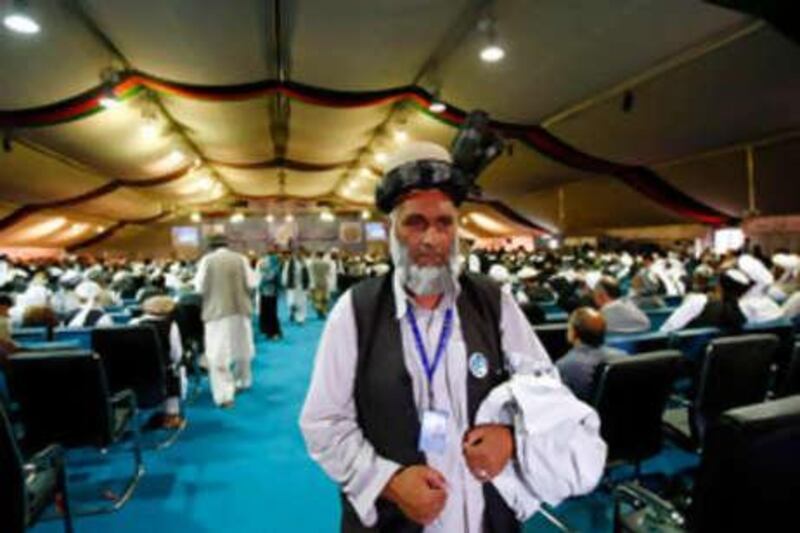KABUL // The start of a nationwide peace conference in Kabul was overshadowed yesterday when rebels launched a major attack on the event, injuring one of the Afghan president's bodyguards. Senior government officials, religious leaders, tribal elders and women were sat alongside foreign diplomats when the insurgents struck, firing rockets at the tent where the traditional assembly, or "jirga", was being held.
Gunfire could also be heard for a sustained period during the morning. Two suicide bombers were eventually shot dead and a third arrested after they breached a cordon disguised in burqas and launched their assault from a nearby building. The attack came as the Afghan president, Hamid Karzai, was delivering his opening remarks, causing him to interrupt his speech and tell the audience, "Sit down, nothing will happen. I have become used to this."
Not everyone was reassured, though, as the rebels again demonstrated their ability to hit at the heart of the heavily guarded capital. "It's horrendous when the Taliban can attack the jirga," said Haji Arbab Faramooz, an elder and delegate from Baghlan province. "Obviously it shows they have links inside the government. Our vehicles and our bodies are searched 10 times when we come to the jirga, so how can a man with a gun and ammunition get close to the area and start shooting? If they can get to this area then there is no government."
Around 1,500 delegates have arrived in Kabul for the jirga, which is a type of council traditionally convened to address issues of national importance. The stated aim this time is to help establish terms for reconciliation with the insurgency and Nato has billed it as a potentially crucial step towards peace and stability. However, the Taliban have denounced the event, describing it as "part of the failed efforts of the invading Americans and their surrogates". They continue to demand the withdrawal of foreign troops and have claimed responsibility for yesterday's assault.
Mohammed Omar Safi, a delegate from Balkh province, recalled the moment when he realised something was wrong. "Karzai sahib welcomed all the elders and then focused on the main issue of the jirga, which is to ask all sides to help bring a permanent peace to Afghanistan," he said. "The strange thing was that during his speech we heard some rockets landing." Despite the attack, delegates carried on working throughout the rest of the day and the jirga is still due to last until tomorrow, as scheduled. Burhanuddin Rabbani, the president of Afghanistan during the 1992 to 1996 civil war and historically a bitter enemy of the Taliban, has the task of leading it.
In his opening comments, Mr Karzai attempted to reach out to men who had joined the insurgency because of "mistakes" made by the government and international forces, but denounced "those who kill students, teachers, scholars". "You should provide the opportunity for the foreign forces to leave," he declared. "Make peace me with me and there will be no need for foreigners here. As long as you are not talking to us, not making peace with us, we will not let the foreigners leave."
However, the Taliban are not alone in criticising the jirga. A second major insurgent group, Hizb-e-Islami has claimed it "holds no importance" because all the participants have close ties to the government. Mr Karzai's main rival in last year's presidential election, Abdullah Abdullah, has also dismissed the event. Zarghona Kakar, a delegate from Kandahar, blamed yesterday's attack on "the enemies of Afghanistan".
"It will have an effect on the ordinary people outside the jirga, who will have been very worried about the conditions inside," she said. "But the people inside are just carrying on." With bloodshed at record levels and a summer of intense fighting expected to lie ahead, there is a growing consensus in Afghanistan that some kind of deal with the rebels must be struck sooner rather than later. A planned government strategy funded by the international community is believed to include an offer of vocational training to low level fighters who lay down their arms and a chance for militant leaders to be given exile abroad.
Even after yesterday's violence, some delegates were still optimistic that significant progress will have been made come the end of the week. "In the history of Afghanistan, jirgas have always brought peace," said Noor Mohammed Kafil Noori, from Kapisa province. "We will achieve a lot." @Email:csands@thenational.ae





